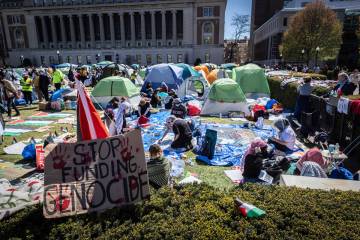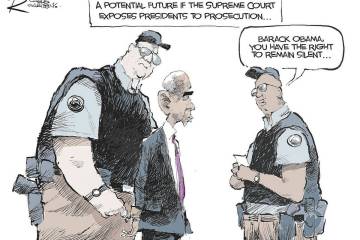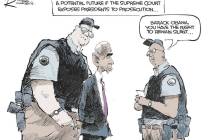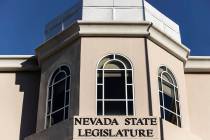COMMENTARY: Bill to roll back occupational licensing hurdles dies in Carson City
Looking for a full-time job? Don’t come to Nevada. Last year, MarketWatch named ours as the worst state in the country for full-time job seekers and our current underemployment rate is 12 percent, the third highest nationwide.
Ridding our state of these dubious distinctions should be a top priority for lawmakers. Apparently, it’s not.
How else to describe recent events in the Legislature? Lawmakers passed up a golden opportunity to roll back policies that create unnecessary employment barriers for people who struggle most. A bill that would have ended overly burdensome occupational licensing died in committee, and workers in Nevada lost out — again.
Occupational licenses require aspiring workers to get government permission slips to enter their chosen field. In the 1950s, licensing applied to about 5 percent of the workforce, mostly high-income professions such as doctors and lawyers, as one might expect. But today, at least one-in-four occupations requires a license, according to the U.S. Bureau of Labor Statistics.
Here in Nevada, professions ranging from interior decorators, to landscape workers, to travel agents require a license. And they are expensive to obtain. The average license in our state requires $505 in fees, 601 days of education and experience, and two exams. For someone attempting to break into the workforce, this is an unaffordable burden.
In fact, according to a 2012 study of 102 low-and middle-income occupations nationwide by the Institute for Justice, Nevada has the most expensive and the third most burdensome licensing laws in the country for lower- and moderate-income occupations. A 2015 Obama administration report found that “licensing can … reduce employment opportunities and lower wages for excluded workers.” And the same report found “licensing laws also lead to higher prices for goods and services.”
Bad for workers, bad for consumers — so why do licensing laws persist?
Proponents claim licensing protects the public. However, the 2015 White House report concluded, “Most research does not find that licensing improves quality or public health and safety.” That stands to reason when we’re talking about occupations such as interior decorator. In the 47 states where this occupation goes unlicensed, there’s yet to be a life-threatening epidemic of misplaced chaise lounges and credenzas.
The true objective of most licensing boards is to insulate industry players from unwanted competition. In Nevada, and elsewhere, these boards are typically made up of people who already practice the profession. The boards enable them “to obtain a degree of monopoly control, or the ability to ‘fence out’ competitors for a service,” explains the University of Minnesota’s Morris M. Keleiner. The 2015 White House report blamed this lack of competition for an increase in prices of up to 16 percent.
The good news is public officials are beginning to realize the harmful effects of occupational licensing — and they’re starting to act.
In February, acting Federal Trade Commission Chairman Maureen Ohlhausen announced the creation of a task force to curb burdensome occupational licensing regulations nationwide. Mississippi recently enacted landmark legislation that ensures occupational licenses are truly in the public’s health and safety interests, while Arizona and others have also enacted meaningful reforms targeting specific boards or particularly egregious requirements.
The Nevada professional licensing bill, Assembly Bill 353, would have built on this progress, reining in occupational regulations by requiring that their purpose be “to increase economic opportunities, promote competition, and encourage innovation.” Regulators would have been required to use the “least restrictive means” possible in regulating occupations and “licensure by a governmental entity or regulatory body” would have become a last resort rather than standard practice.
Instead, lawmakers kept regulations in place. It’s too late for this bill, but the fight to help Nevadans improve their lives and climb the ladder of opportunity has only just begun.
Elliot Malin is the Nevada senior policy analyst of Americans for Prosperity.




























